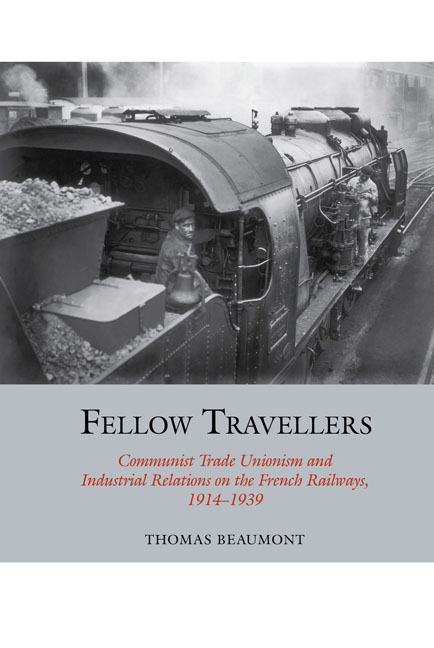 Fellow Travellers
Fellow Travellers This chapter examines one of the seminal periods in French interwar social and political history, the series of railway strikes in the winter and spring of 1920, culminating in the month-long railway general strike of May. This is a subject which has drawn the interest of a number of historians, notably the early investigations of Annie Kriegel, who in her analysis of the cheminot strike was able to draw upon source material that has since been destroyed. During the 1980s, the publication of the highly significant respective studies by Georges Ribeill and Adrian Jones shed important new light on the period. This chapter sets the 1920 strikes in the broad context of post-war labour militancy. Growing frustration at the emerging political and social settlement in the period after the armistice led French railway workers into an increasingly militant stance through the course of 1919. Though the reformist ‘majoritaire’ leadership were able to contain this discontent through 1919, by the end of this year they found themselves squeezed between, on the one hand, an increasingly pragmatic revolutionary ‘minoritaire’ current that was gaining ground among the cheminots and, on the other hand, an intransigant railway management keen to reassert their authority on the railways. In the winter and spring of 1920, the reformists would lose their control over the rank and file. The resulting major confrontation between railway workers and the French state would have significant consequences that shaped railway industrial relations for years to follow.
Railway Workers and the ‘Spirit of 1919’
‘Above all’, argues Tyler Stovall, ‘1919 was a year of revolution, both actual and potential.’ Internationally and in France itself, revolutionary change appeared imminent. In March, just a little over a year following the Bolshevik's revolution, the first Congress of the Communist International was held in Moscow. Though largely attended by Russian delegates due to the difficulties European socialists faced in reaching the newly created Soviet state, the official creation of a new International designed to spread Bolshevik-style revolution worldwide captured the imagination of revolutionaries in the west.
The founding of the Comintern in the spring of 1919 coincided with a period of labour unrest and worker protest that in certain European regions and cities irrupted into revolutionary crises for the existing regimes. In Germany workers’ uprisings and strikes were followed by counter-revolution.
To save this book to your Kindle, first ensure [email protected] is added to your Approved Personal Document E-mail List under your Personal Document Settings on the Manage Your Content and Devices page of your Amazon account. Then enter the ‘name’ part of your Kindle email address below. Find out more about saving to your Kindle.
Note you can select to save to either the @free.kindle.com or @kindle.com variations. ‘@free.kindle.com’ emails are free but can only be saved to your device when it is connected to wi-fi. ‘@kindle.com’ emails can be delivered even when you are not connected to wi-fi, but note that service fees apply.
Find out more about the Kindle Personal Document Service.
To save content items to your account, please confirm that you agree to abide by our usage policies. If this is the first time you use this feature, you will be asked to authorise Cambridge Core to connect with your account. Find out more about saving content to Dropbox.
To save content items to your account, please confirm that you agree to abide by our usage policies. If this is the first time you use this feature, you will be asked to authorise Cambridge Core to connect with your account. Find out more about saving content to Google Drive.